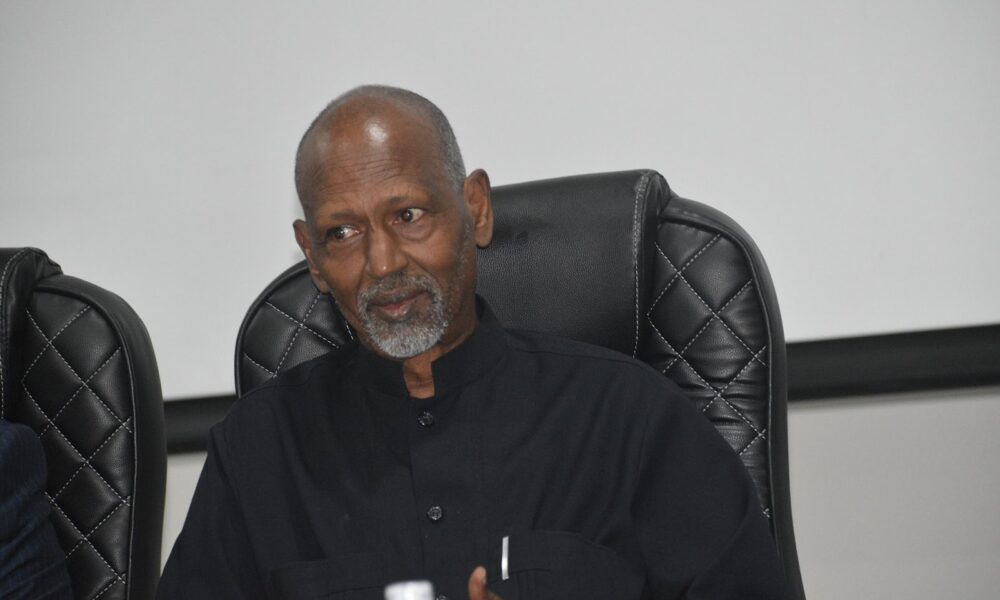By Kidega Livingstone
South Sudan can only achieve a peaceful and democratic nation by holding elections, the Intergovernmental Authority on Development (IGAD) has noted.
“South Sudan has to go for election because it’s the way for democracy,” Ambassador Dr. Ismail Wais, IGAD’s Special Envoy to South Sudan, remark.
The comments of the IGAD representative came on Thursday, during the closing of an inter-party dialogue organized by South Sudan Civil Society Organizations.
He described the current government as “the government for Agreement” for power sharing after the war.
Amb. Wais said Intergovernmental Authority on Development is going to stand for South Sudan until the peace process concludes.
“We want to see the government that is elected by the people and for the people,” he stressed.
As the IGAD, we are going to do everything possible to make sure that there are free and credible elections,” Wais added.
Meanwhile, according to R-JMEC Advisor on Transitional Justice, Chris Gitari Gitari, the elections present an opportunity for citizens to end the transition period.
South Sudan Civil Society Forum had organized a three-day inter-party dialogue to discuss end of the transition government, as elections approach.
The Forum came up with the resolutions to push for dialogue to build consensus among political parties to the peace agreement.
They also resolved on the position of the media and civil society as a body to bridge the gaps between the government and the opposition.
However, Jackline Achio, representing South Sudan Civil Society Forum, highlighted outstanding provisions that could lead to a transition extension.
These, she said include the constitution, unified forces, and census.
“We are calling upon the parties to the agreement to come to a round table to end the transition,” she said.
Achio also urges the International Community to support South Sudan in ending the transition for a peaceful.
“We call on the United Nations, African Union, and the rest to stand with us and they should not leave us alone,” Achio further appealed.
Bishop Moses Deng Bol, a Faith-Based representative at the forum, emphasized the importance of consensus-building among parties to peace agreement, to end the transition.
“We don’t want somebody always to come and help us. Let us try to meet alone as South Sudanese to solve our problems” he urged.
Election Doubt
With less than 8 months to the conduct of elections, Parties to the agreement are at odds over the matter.
The ruling Sudan People’s Liberation Movement (SPLM) has maintained the elections must take place to end the cycle of transitional governments.
On Wednesday, the SPLM proposed that presidential and gubernatorial elections be held due to funding shortages and literacy concerns.
In a statement signed by Party Secretary General Peter Lam Both, the group argued that necessary institutions and legislation are in place, and the parliament is about to approve a budget during the first weeks of April.
“The substantive institutions and legislations necessary for the conduct of the elections have been put in place. What now remains is for the National Assembly to approve the budget for the elections institutions in the first week of April 2024 so that they can start their work immediately,” the group said.
“The Political Parties signatory to the R-ARCSS must now dialogue on whether we will go for General Elections or Executive Elections given the budgetary consideration for the elections and the literacy of our voters as too many election boxes for so many candidates might confuse many people on the election day,” it said.
“We propose that we conduct Presidential and Gubernatorial elections in December 2024 and the Parliamentary elections to follow after one year of the elected government,” the statement added.
But Sudan People’s Liberation Movement-In Opposition (SPLM-IO) has demanded a mediator to be involved in the parties’ election dialogue.
“In light of the challenges registered during the five (5) years of implementation, we would like to state that dialogue and its outcome shall only be credible in the presence of a mediator,” Machar said.
“In addition, there is a critical need to demonstrate political will on the part of the parties and the resolution of the critical issues that have been affecting the implementation of the agreement,” he added.
Meanwhile, the National Democratic Movement (NDM) and Sudan People’s Liberation Movement In-Opposition (SPLM-IO) emphasized the need for dialogue and mediation to achieve consensus on the conduct of elections.
They argue that key elements of the revitalized agreement, such as constitutional matters, consensus-building, and unification policies, have not been adequately implemented within the agreed-upon timeframe.
Dr. Lam Akol, Chairman of the National Democratic Movement, expressed concerns that holding elections without political dialogue would be unsafe due to a lack of trust between the principal parties.
“We are not ready for the election. The dialogue we are talking about is to discuss how to end the transition period and when, said Dr. Akol said.
“Those who want to go for elections should tell us why, and those who don’t want to should also tell us why; that will be the meaning of the dialogue we are seeking,” he added.




